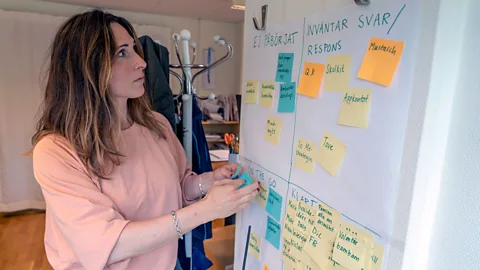Burnout is rising in the land of work-life balance
 Benoît Derrier
Benoît DerrierSweden is famous for championing a balanced lifestyle, but the number of young people being signed off work with severe stress is mushrooming.
This is the first story in our Nordic Way series, that examines life in Scandinavia and beyond.
If you’re aware of global stereotypes about Sweden, working life in the Nordic nation might conjure up images of Scandi-sleek ergonomic offices, numerous breaks for coffee and cinnamon buns (called fika in Swedish), or clocking off early on Fridays to disappear to a lakeside cottage.
While not all workers are afforded such luxuries, figures suggest less than 1% of Swedes work 50 hours a week or more, and citizens are guaranteed at least five weeks’ holiday. There’s a strong culture of flexible working, alongside some of the most generous parental leave and subsidised childcare policies in the world. So it’s not a place you’d imagine finding an exhausted employee struggling to complete workplace tasks or unable to switch off at home.
But the number of people diagnosed with chronic stress-related illnesses – including exhaustion, a condition also referred to as ‘clinical burnout’ – has risen rapidly in recent years. This category of sickness was the most common reason for Swedes to be off work in 2018, according to the Swedish Social Insurance Agency, accounting for more than 20% of sickness benefit cases across all age groups.
Rates have shifted dramatically among young workers, with cases up by 144% for 25-29 year-olds since 2013. Women are more likely than men to be off sick with exhaustion – experts say women still spend more time on household chores regardless of whether they have children or not, are over-represented in stressful, care-based jobs such as nursing and social work – but the rise has been noticeable across both genders and in different sectors.
‘A constant high, high, level of stress’
Natali Suonvieri, a 27-year-old based in Gothenburg on Sweden’s west coast, is among those affected. She says she “hit the wall” and was signed-off with exhaustion in 2017, while she was working as a marketing manager for a small start-up. Her standard working hours were 0800-1700, though she sometimes worked overtime and checked her emails in the evening.
“I had a constant high, high, level of stress,” she explains. “I was actually on sick leave for more than one year, and for three, four months I was lying in bed in the foetal position, more or less.” She says she still has problems with cognitive issues. “I have trouble with focusing. I have trouble concentrating... trouble remembering stuff.”
While many countries do not formally recognise exhaustion or clinical burnout as a medical condition, it has been a legitimate diagnosis in Sweden since 2003.
Video by Maddy Savage and Benoît Derrier.
Professor Marie Åsberg, a psychiatrist at Karolinska Institute, Sweden’s largest academic medical research centre, explains that it is important to recognise that the condition encompasses much more than the “feeling of being overwhelmed” at work, which is a common reaction during stressful periods that we often refer to as “burnout” and usually subsides when things calm down.
Although the symptoms of clinical burnout can vary, she says they typically include “a chronic ongoing stress”, which might manifest in severe fatigue, anxiety, concentration difficulties and other cognitive disturbances. “Once you develop it, it takes a very long time to recover. If your brain doesn’t function properly, it is terribly difficult to go to work and do a normal job,” she says. Asberg believes recent years have seen “epidemics” of the condition in Sweden.
A Swedish problem?
International comparisons are tricky, because definitions of burnout vary and not all countries recognise the diagnosis. But when it comes to the high figures in Sweden, one argument is that since Swedes were early to formulate a medical diagnosis for the condition, this has helped break down taboos, encouraging more people to come forward and making employers more aware of and accepting of the problem.
“People used to think it was some kind of mumbo jumbo... but the debates about mental health in general and burnout have been more and more common, which also of course increases the tendency to seek help and to talk about it,” explains Selene Cortes, a spokesperson on clinical burnout for Swedish mental health charity Mind.
Professor Marie Åsberg also points out that Sweden’s generous welfare system plays a role: those who are diagnosed with exhaustion can typically receive approximately 80% of their salary, capped at 774 Swedish krona ($83, £66) per day. “The state pays, so you are not supposed to suffer economically if you are ill,” she explains. “And because of that, the state has created very good databases of people who are on sick leave and why.”
But even if Swedes have a greater tendency or economic ability to seek help, how can we unpack the disconnect between the nation’s short working hours and obsession with work-life balance, and the prevalence of a condition characterised by chronic stress levels?
“I can see why people outside Sweden might have a hard time believing we’re getting burned out, when we have everything served up on a plate,” says Pia Webb, a Swedish life and career coach certified by the European Mentoring and Coaching Council.
She believes it is something of a “Swedish problem” that while many people clock off work at 1700 or even earlier and are “very bad at doing nothing”. She argues there is strong social pressure to invest time in “being fit, being busy and looking perfect”, which she believes has increased in recent years.
Swedes work out more than any Europeans other than the Finns, according to a recent Eurobarometer poll, with almost one in three exercising five times a week or more. Although numerous studies have confirmed the benefits of exercise in boosting mental health, Webb argues that there are dangers when it comes to competing in “increasingly tough races and challenges”, or training with the goal of achieving a certain body type. These pressures could help explain why younger people are more frequently succumbing to exhaustion, she says.
 Benoît Derrier
Benoît DerrierIt’s a view that Cecilia Axeland, 25, from Stockholm agrees with. She was working above average hours and “travelling a lot” in a sales job when she experienced a clinical burnout two years ago, but says that the pressure to work out and “achieve things” in her spare time was also a major trigger for her exhaustion.
“I felt the pressure...you need to be healthy, you need to eat healthy, you need to relax but you also need to be ‘out there’,” she explains. “And since I also do music...I never basically rested and that drained me.”
Contemporary pressures
Professor Marie Åsberg says she is sceptical about whether these types of pressures are stronger in Sweden than in other Western countries, however she agrees that a failure to schedule proper relaxation time is the most crucial factor leading to clinical burnout, and helps explain why exhaustion is not just a reaction to working long hours.
The brain, Åsberg explains, cannot differentiate between employment and other work-like tasks, such as planning a lot of activities in your spare time, having a competitive hobby, or staying up late to ensure your social media profile is up-to-date.
“I guess the brain doesn’t care if you get paid for it, or not,” she says, adding that most people who “hit the wall” are “very ambitious” and “don’t sleep enough”. “They want to succeed and show the world how good they are, so they overtax their own strengths and endurance.”
She argues that alongside social media and smartphones, there are other contemporary pressures that may be influencing the increase in exhaustion disorders both in Sweden and elsewhere.
In today’s competitive job market, where young people can struggle to secure permanent employment in popular fields, she believes many are so “keen and eager to show that they are good”, that they work harder than they need to.
Modern mantras that encourage us to live out our dreams can also increase pressure and create disappointment when things don’t go to plan. “These days you are told from childhood that if you just work a bit, you can be anything – all opportunities are open to you – and that is not the case for everyone.”
 Benoît Derrier
Benoît DerrierAn individual or collective issue?
Some experts argue that the way Swedish society is structured also puts a unique strain on young people’s mental health. Selene Cortes, from mental health charity Mind, reflects that Sweden is one of the world’s most individualistic and secular countries, according to global research project the World Values Survey (WVS).
There is a cultural norm suggesting Swedes should be independent from a young age, which Cortes says can feel like a burden or mean that some don’t communicate struggles that could be warning signs for a clinical burnout. “Young people are quite lonely in the process of creating a future life,” she argues.
Pia Webb, who has lived in the UK and worked with clients from across Europe as well as Sweden, has a similar message. “Other cultures are more family-oriented...people help each other more,” she argues. “And I think with that also comes more relaxation time, and just being in the ‘here and now’, whether that’s a big get-together for a dinner, or in the UK just sitting around having a cup of tea.”
Preventing burnout
When it comes to tackling clinical burnout in Sweden and elsewhere, there is a split between those who believe it is up to individuals to take matters into their own hands and those who argue it is more of a societal problem.
“It’s easy to say ‘it’s society’s fault that I am getting it’ [burnout] and ‘I am just another number’, or even to feel some ‘prestige’ for working so hard,” argues Webb. But she suggests many of those who end up off work with exhaustion have failed to tackle personal issues such as perfectionism, anxiety or confidence problems.
 Benoît Derrier
Benoît Derrier“Being busy is an easy way of not dealing with those issues,” she says. “Of course working long hours or not having a supportive manager might drain you further, but if you still haven’t dealt with your issues, you will never manage as well as you could.”
But former marketing manager Natali Suonvieri argues that the emphasis should be on helping companies do more to ensure employees can manage their stress levels. She now works as an educator in sustainable work life, after going back to university to study for a Masters in Employment Relations and Organisational Psychology following her own exhaustion.
“Anybody can get burned out,” argues Suonvieri, who also runs Sweden’s biggest Facebook community for women experiencing stress. “It's not about the amount of time that you're working, it's about the control and the resources you have in the workplace… so that [you know you can] do a sufficient and a high-quality job,” she says. “It’s a complex issue, involving everything from leadership to what kind of working environment you have in general.”
Suonvieri also says she is sceptical about official figures that suggest less than 1% of Swedes regularly work long hours, arguing that many employees and employers do not properly track how much time is spent checking emails or texts once the official work day is over.
Clinical solutions
While by far “the best treatment is prevention”, Professor Marie Åsberg says that Sweden’s healthcare system offers a range of heavily-subsidised treatments for people with exhaustion that other countries might learn from.
These include group stress courses, where participants are given tips and exercises to help tackle their stress. “It helps you get over this sense of shame,” says Åsberg. “They (the other group members) have the same condition as you, and you see they are good people and interesting people and then logically there is no reason to be ashamed.”
“You’ve kind of got this network of people going through the same thing,” agrees Cecilia Axeland, who participated in a stress course as well as a state-subsidised sleep programme after her clinical burnout. “That's something that I felt helped me, because I understood I'm not alone.”
Some Swedes with exhaustion are also offered individual therapy, but there are long waiting lists in some regions, due to a shortage of trained psychotherapists, which has become an increasingly debated social and political issue in recent years.
 Benoît Derrier
Benoît DerrierBut Åsberg argues that one of the most sought-after talking therapy treatments, Cognitive Behavioural Therapy, which aims to train patients replace unhelpful thoughts with more useful or realistic ones, can actually have a negative impact on people suffering from exhaustion, especially in the early stages. “It may be counterproductive, because it teaches people to do a lot of things and work on their own recovery when they should just be resting at this point.”
Taking time out to unwind completely is also Cecilia Axeland’s advice to fellow sufferers. After getting plenty of rest during her four months of sick leave, she studied for a year and now has a new job in the tech industry. But she is much more conscious about finding the time to “switch off” from her day job and hobbies than before she got ill.
“I usually go out on walks to just clear my mind and leave my phone at home. No one can reach me,” she says. “Before my burnout, I really needed to prove myself... and now I would say I am a lot kinder to myself... that’s what’s most important.”
